De Amerikaanse schrijver Robert Coover werd geboren op 4 februari 1932 in Charles City, Iowa. Zie ook mijn blog van 4 februari 2007.
Uit: Stepmother
„Look at it this way, love, I tell her: no more slops to empty.
I get no rise out of her, game as she is, my poor desperate daughter, her head is locked on one thing and one thing only: how to escape her inescapable fate. How many I’ve seen go this way, daughters, stepdaughters, whatever—some just turn up at my door, I’m never quite sure whose they are or where they come from—but I know where they go: to be drowned, hung, stoned, beheaded, burned at the stake, impaled, torn apart, shot, put to the sword, boiled in oil, dragged down the street in barrels studded on the inside with nails or nailed into barrels with holes drilled in them and rolled into the river. Their going always sickens me and the deep self-righteous laughter of their executioners causes the bile to rise, and for a time thereafter I unleash a storm of hell, or at least what’s in my meager power to raise, and so do my beautiful wild daughters, it’s a kind of violent mourning, and so they come down on us again and more daughters are caught up in what the Reaper calls the noble toils of justice and thus we keep the cycle going, rolling along through this timeless time like those tumbling nail-studded barrels.
Of course, the child, naked and spread-eagled and shackled to the floor below me, expects me to get her out of this somehow. I’m a witch, I should be able to do something. And it’s true, I do have a few tricks, though in general it’s more useful to be thought a witch than to be one. An aura lingers on, accruing respect, but tricks are only tricks and they come and go. Magic rings and slippers are misplaced or stolen, unbreakable rods get broken, spells collapse for a fault in the grammar or a memory lapse. To which I’m increasingly given, as if my inborn malice were being mocked by my own particulates. Nevertheless, I’ve gotten in here only because I’ve been able to change into a bleating lamb and put her jailors in a trance.“

Robert Coover (Charles City, 4 februari 1932)
De Duitse schrijver en journalist Norman Ohler werd geboren op 4 februari 1970 in Zweibrücken. Zie ook mijn blog van 4 februari 2007 en ook mijn blog van 4 februari 2008.
Uit: “Jetzt gibt es da niemanden” (In: Die Zeit, 29 december 2007)
“Nach der Ermordung Benasir Bhuttos fürchten Pakistans Intellektuelle, unter ihnen auch Bhutto-Kritiker, den Zerfall des Landes. Mancher gibt Präsident Musharraf die direkte Verantwortung an Bhuttos Tod.
Eine Kugel findet ihr Zuhause. Eine Kriminelle ist tot. Stunden später brennt Karachi, nicht mit der Trauer der Massen, sondern mit der Wut der Verarmten: tägliche Frustrationen, sonst ungehört in den Betonkorridoren der Macht.
In Karachi setzt der Staub sich nicht, sondern implodiert in Flammen und in mitternächtlichen Schreien und Lachen – und Plünderungen. Farbenfrohe Busse verbrennen zu schwarzen Skeletten. Fahrräder werden gestohlen und gehen in Feuer auf. Eine orangefarbene Opfergabe des Ärgers frisst sich in den Nachthimmel hinein.
Und selbst zum Morgengrauen kann der Staub sich nicht setzen: kann der Staub nur gebrochen werden. Die Toten muss man beerdigen, solange die Erde noch warm, während Mütter und Witwen auf großen öffentlichen Plätzen trauern, bevor das Militär aufmarschiert unter schreienden Sirenen, die den Klang ihrer Trauer ertränken.
Im gutbürgerlichen Stadtteil Defense sind die Straßen still. Unser Atem ist angehalten hinter den verschlossenen Türen. Unsere Tore werden beschützt, von Wachen mit Waffen. Unsere Ohren sind taub vom Luxus der Distanz.
Jenseits der Brücke schicken brennende Reifen Rauchsäulen als Gummiopfer in den Himmel: ziehen den Mob an, der brummt. Männer in billigen Sandalen und Pullovern aus zweiter Hand: Männer, die wie Tage ohne Wasser riechen und wie Nächte in zerschlissenen Tüchern.
Heute Nacht riechen sie angeschmort.
Heute Nacht tragen sie das Feuer in sich und Blut an ihren Händen.”

Norman Ohler (Zweibrücken, 4 februari 1970)
De Amerikaanse schrijver Stewart O’Nan werd geboren op 4 februari 1961 in Pittsburgh, Pennsylvania. Zie ook mijn blog van 4 februari 2007 en ook mijn blog van 4 februari 2008.
Uit: Songs for the Missing
“July, 2005. It was the summer of her Chevette, of J.P. and letting her hair grow. The last summer, the best summer, the summer they’d dreamed of since eighth grade, the high and pride of being seniors lingering, an extension of their best year. She and Nina and Elise, the Three Amigos. In the fall they were gone, off to college, where she hoped, by a long and steady effort, she might become someone else, a private, independent person, someone not from Kingsville at all.
The sins of the Midwest: flatness, emptiness, a necessary acceptance of the familiar. Where is the romance in being buried alive? In growing old?
She did not hate the town, as, years later, her sister would tell one lover. Not Kim, not the good daughter. She loved the lake, how on a clear day you could see all the way to Canada from the bluffs. She loved the river, winding hidden in its mossy gorge of shale down to the harbor. She even loved the slumping Victorian mansions along Grandview her father was always trying to sell, and the sandstone churches downtown, and the stainless steel diner across from the post office. She was just eighteen.
At the Conoco, on break, she liked to cross the lot and then the onramp and stand at the low rail of the overpass, French-inhaling menthols in the dark as traffic whipped past below, taillights shooting west into the future. Toledo was three hours away, on the far side of Cleveland, far enough to be another country. Trucks lit like spaceships shuddered under her feet, dragging their own hot wind, their trailers full of unknown cargo. Slowly, night by night, the dream of leaving was coming true — with her family’s blessing, their very highest hopes. She could not regret it. She could only be grateful.“
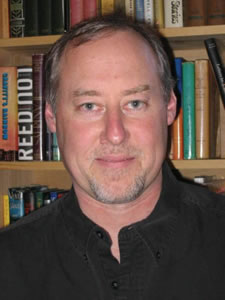
Stewart O’Nan (Pittsburgh, 4 februari 1961)
De Oostenrijkse toneelschrijver Werner Schwab werd geboren in Graz op 4 februari 1958. Na zijn studie aan de Weense kunstacademie van 1978 tot 1982, leefde Werner Schwab teruggetrokken op een boerderij in de Steiermark. Daar maakte hij ruimtelijke objecten onder meer van vlees en kadavers en schreef hij zijn eerste korte teksten. Pas in 1990 legde hij zich op het schrijven van toneelstukken toe met het stuk De presidentes. In de vier jaren tussen dit stuk en zijn dood op nieuwjaarsdag 1994 schreef hij de overige 15 toneelstukken. Zeven van zijn stukken beleefden hun première pas na zijn dood. Schwab stierf waarschijnlijk aan een alcoholvergiftiging.
Uit: Sein letzter Text
„Lieber ?
Die Mama ist schon ganz unverfroren eine speckige Drecksau. Da verabschieden sich die Schinkenfleckerl nun schon tagelang von einer jeglichen Genießbarkeit, nachdem sie unter der Schirmherrschaft der allgemeinen Unappetitlichkeit schleimgeboren werden mußten, weil der Osterschinkenspeck der längst verdauten Auferstehungstage schon ranzig geschwitzt hat und die Fleckerlnudeln freilich längst abgelaufene Beerdigungsnudeln waren, aber deswegen halbpreislich veranschlagt, und trotzdem glänzen die Schinkenfleckerl täglich auf dem Tisch und duften wie ein ungewaschener Schlachthof.
Aber innerhalb der Schinkenfleckerl befinden sich haufenweise lebensgünstige Vitamine, sagt
die Mama, und bevor unsere Körper die nicht verbrannt haben, kocht sie keine neuen
Gerichte, die neue Urteile über unsere Verdauungen aussprechen.
In der Siedlung wird die Mama vordergründig umfangreich bewundert, weil sie in den
Geschäften immer gute Ratschläge ausstreut, wie man mit einer schwer bewaffneten Einkaufspolitik den niedrigen Wert der Geldscheine unterlaufen kann. Andererseits rollen die Geschäftsleute gleich die jeweiligen Augen, wenn die Mama die Geschäfte überfällt mit sich, und die eintretende Lebensmittellosigkeitskundschaft betrachtet immer erst einmal mit kreisenden Köpfen das Lebensmittelgeschäft, ob die gierige Mama schon da ist, bevor sie in die Innereien des Geschäfts eindringen. Aber meistens ist die Mama schon da und hat sich die besten Gemüseabfälle aus dem Magazin schon kostenschonend ausliefern lassen.“

Werner Schwab (4 februari 1958 – 1 januari 1994)
De Canadese dichter E. J. Pratt werd op 4 februari 1882 geboren in Western Bay, Newfoundland. Zie ook mijn blog van 4 februari 2007.
Erosion
It took the sea a thousand years,
A thousand years to trace
The granite features of this cliff,
In crag and scarp and base.
It took the sea an hour one night,
An hour of storm to place
The sculpture of these granite seams
Upon a woman’s face.
The Ground Swell
Three times we heard it calling with a low,
Insistent note; at ebb-tide on the noon;
And at the hour of dusk, when the red moon
Was rising and the tide was on the flow;
Then, at the hour of midnight once again,
Though we had entered in and shut the door
And drawn the blinds, it crept up from the shore
And smote upon a bedroom window-pane;
Then passed away as some dull pang that grew
Out of the void before Eternity
Had fashioned out an edge for human grief;
Before the winds of God had learned to strew
His harvest-sweepings on a winter sea
To feed the primal hungers of a reef.
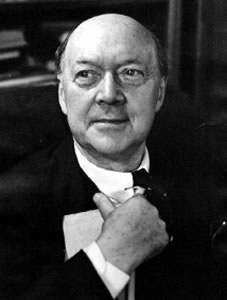
E. J. Pratt (4 februari 1882 – 26 april 1964)
De Deense schrijver, criticus en filosoof Georg Brandes werd geboren op 4 februari 1842 in Kopenhagen. Brandes studeerde rechten en filosofie in Kopenhagen en reisde vervolgens door heel Europa. Van 1877 tot 1882 woonde hij in Berlijn. Door zijn reizen en lezingen maakte hij zich verdienstelijk voor de kennis van de Scandinavische literauur in de rest van Europa. Aan de andere kant introduceerde hij Friedrich Nietzsche in Denemarken. Hij schreef o.a. boeiende essays over Goethe, Michelangelo, William Shakespeare en Voltaire. Qua literaire stroming is hij in te delen bij het realisme en naturalisme. Ook wordt hij wel gezien als de vader van het antiklerikalisme in Denemarken.
Uit: Recollections Of My Childhood And Youth
„He was little and looked at the world from below. All that happened, went on over his head. Everyone looked down to him.
But the big people possessed the enviable power of lifting him to their own height or above it. It might so happen that suddenly, without preamble, as he lay on the floor, rummaging and playing about and thinking of nothing at all, his father or a visitor would exclaim:
“Would you like to see the fowls of Kjöge?”
And with the same he would feel two large hands placed over his ears and the arms belonging to them would shoot straight up into the air. That was delightful. Still, there was some disappointment mingled with it. “Can you see Kjöge now?” was a question he could make nothing of. What could Kjöge be? But at the other question: “Do you see the fowls?” he vainly tried to see something or other. By degrees he understood that it was only a phrase, and that there was nothing to look for.
It was his first experience of empty phrases, and it made an impression.
It was just as great fun, though, when the big people said to him:
“Would you like to be a fat lamb? Let us play at fat lamb.” He would be flung over the man’s shoulder, like a slaughtered lamb, and hang there, or jump up and ride with his legs round the man’s hips, then climb valiantly several steps higher, get his legs round his shoulders, and behold!“
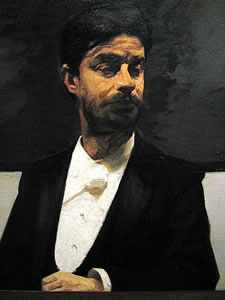
Georg Brandes (4 februari 1842 – 19 februari 1927)
Portret door Harald Slott-Møller (detail)
De Moldavische dichter en schrijver Grigore Vieru werd geboren in Pereita op 4 februari 1935. In 1957 maakte hij zijn debuut met een gedichtenbundel voor kinderen. Het jaar erop studeerde hij af aan de “Ion Creangă Pedagogische Staatsuniversiteit” in Chişinău in de richtingen geschiedenis en filologie. In 1959 werd hij uitgever van het Nistru-magazine, uitgegeven door de Moldavische schrijversbond. Van 1960 tot 1963 was hij hoofduitgever van de “Cartea Moldovenească”-uitgeverij. Voor zijn boek “Versuri pentru cititorii de toate vârstele” (“Poëzie voor alle leeftijden”) kreeg Vieru in 1967 de Moldavische prijs voor jeugdliteratuur. Zijn boek “Uw Naam” werd het jaar daarop opgenomen op het hedendaags liteartuurcurriculum van de Moldavische universiteiten, maar door de publicatie van het gedicht “Mannen van Moldavië“, een aflevering van het Nistru-magazine werd het boek vanwege de geldende censuur geschrapt. Hij bezocht Roemenië in 1973 voor de eerste maal. Op uitnodiging van de voorzitter van de Roemeense schrijversbond bezocht Vieru in 1974 en Boekarest, Constanţa, Iaşi en steden in Transylvanië. In 1978 publiceerde de “Junimea”-uitgeverij de “De Vrijdagster “, Vieru’s eerste werk in het Roemeens. In 1989 werd hij parlementslid van Moldavië en was hij betrokken bij de toenadering tussen Moldavië en Roemenië. In 2000 kreeg Vieru de “Eminescu” medaille van de regering van Roemenië.
I have nothing to do with you death
I have nothing to do with you death,
I don’t even hate you at all,
The others will curse you I know
Same way they will slander the light.
But what would you do and how would you live,
If you’d have a mother, and she’d die?
What would you do and how would it be,
If you’d had children and they’d die?!
I have nothing to do with you death,
I don’t even hate you at all,
You are mighty and I’m feeble,
But my life is mine alone.
I am not afraid of you death,
I can only feel pity for you,
You never had mother yourself,
You never had children of yours.

Grigore Vieru (4 februari 1935 – 18 januari 2009)
De Duitse schrijver Alfred Andersch werd geboren op 4 februari 1914 in München. Zie ook mijn blog van 4 februari 2007.
Uit: Die kirschen der Freiheit
„Gebe zu, daß mich solche Gedanken in der Zeit, in der konformiert wurde, nur selten beschäftigen. In der übrigen Zeit lief meine Kindheit ab wie ein Uhrwerk. Wenn ich an sie denke, ergreift mich wieder der Langeweile, das mich umklammert hielt, als ich zwischen den charakterlosen Fassaden der bürgerlichen Mietshäuser aufwuchs, aus denen der Münchener Stadtteil Neuhausen besteht. Meine damals schon bebrillten Augen in einer Landschaft verwaschener Häuserfronten, toter Exzierplätze, aus roten Ziegelwänden zusammengesetzer Kasernen…”
(…)
Ich haßte die Arbeit, die mich jeden Morgen um acht Uhr vor den Kontenrahmen einer Verlagsbuchhandlung zwang, und ich ignorierte die Gesellschaft, die sich ringsum mich, als Organisationsform den totalen Staat errichtete. Der Ausweg den ich wählte, hieß Kunst. Im ganzen war es ziemlich dumme Beschäftigung.”

Alfred Andersch (4 februari 1914 – 21 februari 1980)
De Franse dichter Jacques Prévert werd geboren in Neuilly-sur-Seine op 4 februari 1900. Zie ook mijn blog van 4 februari 2007.
Osiris ou la fuite en Égypte
C’est la guerre c’est l’été
Déjà l’été encore la guerre
Et la ville isolée désolée
Sourit sourit encore
Sourit sourit quand même
De son doux regard d’été
Sourit doucement à ceux qui s’aiment
C’est la guerre c’est l’été
Un homme avec une femme
Marchent dans un musée désert
Ce musée c’est le Louvre
Cette ville c’est Paris
Et la fraicheur du monde
Est là tout endormie
Un gardien se réveille en entendant les pas
Appuie sur un bouton et retombe dans son rêve
Cependant qu’apparaît dans sa niche de pierre
La merveille de l’Égypte debout dans sa lumière
La statue d’Osiris vivante dans le bois mort
Vivante à faire mourir une nouvelle fois de plus
Toutes les idoles mortes des églises de Paris
Et les amants s’embrassent
Osiris les marie
Et puis rentre dans l’ombre
De sa vivante nuit.
Le jardin
Des milliers et des milliers d’années
Ne sauraient suffire
Pour dire
La petite seconde d’éternité
Où tu m’as embrassé
Où je t’ai embrassèe
Un matin dans la lumière de l’hiver
Au parc Montsouris à Paris
A Paris
Sur la terre
La terre qui est un astre.
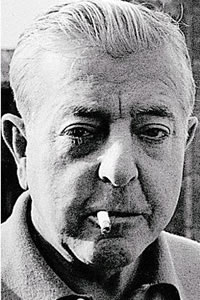
Jacques Prévert (4 februari 1900 – 11 april 1973)
De Nederlandse dichter en schrijver Louis Ferron werd op 4 februari 1942 geboren in Leiden. Zie ook mijn blog van 4 februari 2007 en ook mijn blog van 4 februari 2008.
Ossuarium 4.
De kazematten: snijd aan, dit woord.
De kazematten van Fort Vaux,
waar het zo geuren kon naar stalen oksels.
Zag je de brem, dan rook je de dood
en zet je de spade in ’t vlees
dan bloeden de krekels.
En wat is gebeurd met de vrouwen
die brieven schreven?
Wat met de meisjes die de maan niet meer zagen?

Louis Ferron (4 februari 1942 – 26 augustus 2005)
De Franse dichter en schrijver Jean Richepin werd geboren op 4 februari 1849 in Médéa, Algerije. Zie ook mijn blog van 4 februari 2007.
Uit: Un legs
„Du diable si je pouvais m’attendre à être un jour légataire, pour si peu que ce fût, du vieux docteur Amable Cherpillaud !
Sans doute, il avait été, jadis, le camarade de quartier Latin puis le collègue de mon père. Pas son ami, d’ailleurs ! De cela j’étais certain, leurs relations, si anciennes, n’ayant eu, à aucune époque, rien d’intime. Quant à moi, personnellement, je l’avais à peine fréquenté, même au temps lointain où j’allais chaque année, passer mes vacances chez mes parents à Wimeurs-les-Eppes. Je l’avais connu, alors, surtout de réputation, et plutôt comme une sorte de pauvre imbécile à qui je ne témoignais pas grande sympathie. Enfin, au cours de ces vingt dernières années, ne retournant plus là-bas depuis la mort de mes parents, je l’avais tout à fait perdu de vue.
Il n’y avait donc pas de raison plausible pour que le bonhomme eût pensé à me coucher sur son testament, et encore moins pour qu’il y eût pensé sous une forme aussi singulière et romanesque.
Mais il fallait bien, cependant, me rendre à l’évidence. La lettre du notaire était là, devant mes yeux ébahis. Elle me faisait savoir que le docteur Amable Cherpillaud me léguait… un pli scellé, lequel devait m’être remis en mains propres, sous la condition expresse que j’aurais, après avoir lu ce pli, à le brûler en présence du susdit notaire.“
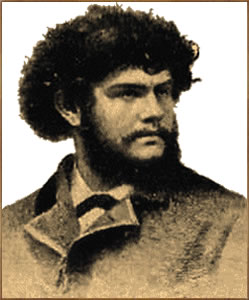
Jean Richepin (4 februari 1849 – 12 december 1926)
De Zweedse Rokoko-dichter en componist Carl Michael Bellman werd geboren op 4 februari 1740 in Stockholm. Zie ook mijn blog van 4 februari 2007.
Epistle No. 36
Our Ulla lay one morning and slept,
A hand beneath her ear;
Her key alone the taverner kept
Or through its hole might peer.
Outside in the tavern, sir,
All was nocturnally quiet;
Beer was none, nor, I’ll aver,
Scarce water to supply it.
On tip-toes
He comes and goes
About her bedside, brothers;
Lifts a bit
Of coverlet,
And whispers with the others.
Ulla quivers,
Snores and shivers,
O’er her head the blanket piles;
Snuggles under,
With a thunder;
Turns about and smiles
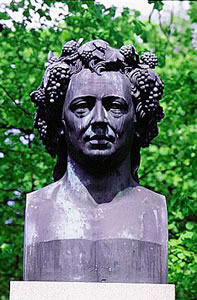
Carl Michael Bellman (4 februari 1740 – 11 februari 1795)
Buste door N Bystrem in Stockholm
